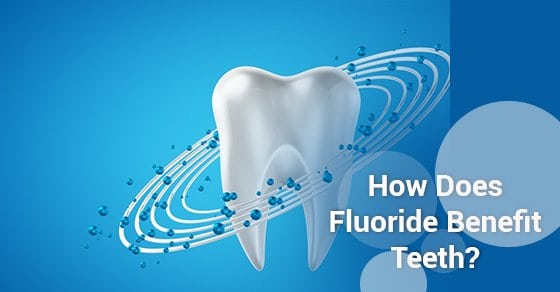No one likes the taste of fluoride but there’s no denying it helps your teeth! Fluoride-containing compounds like sodium fluoride are commonly used topically during dental cleanings. Fluoride therapy, the application of fluoride to the teeth, prevents tooth decay and protects teeth from cavities.

During your dental cleaning, fluoride is applied to your teeth either with a rinse, gel, foam, or varnish. Since fluoride is also added to most tap water, it’s often applied to our teeth without us even realizing it.
So, how exactly does fluoride help our teeth?
What Is Tooth Decay?
When the outer surface of the tooth becomes overly acidic, teeth can begin to decay. Acid is produced by bacteria-containing plaque. There is a reason the dentist warns you against sugar! When sugars interact with the bacteria in plaque they quickly become acidic.
While the acidic plaque will eventually be neutralized by saliva, plaque can hold acid for up to two hours. During this time, demineralisation of the teeth will occur: the calcium and phosphate minerals in our tooth enamel will dissolve into the plaque.
Once the acid in the plaque is neutralized, the minerals will travel back to the enamel, remineralising the teeth. This complicated process is called an “ionic see-saw”.
Remineralisation has its limits, and the teeth have a limited capacity for it. If sugars enter the mouth too frequently and too much mineral loss occurs, it will result in a cavity through which bacteria can reach the inner structure of the tooth. This decay can escalate and destroy the tooth, causing pain and in many cases, the formation of an abscess.
How Does Fluoride Fight Tooth Decay?
In children, there is a period of enamel development from the first tooth until about seven years of age. Fluoride application is especially important during this time as it is proven that fluoride actually alters the structure of the enamel, making it less vulnerable to acid. Parents can also protect your child’s oral health with simple daily habits.
In children and adults, fluoride encourages remineralisation and improves the quality of the enamel.
Fluoride also reduces the acid production of plaque bacteria. Overall, the application of fluoride both to the teeth of children and adults is instrumental in preventing cavities and tooth decay.
As always, fluoride should be part of an excellent oral hygiene routine which includes brushing and flossing daily, and regular visits to the dentist. And, of course, staying away from sugar!